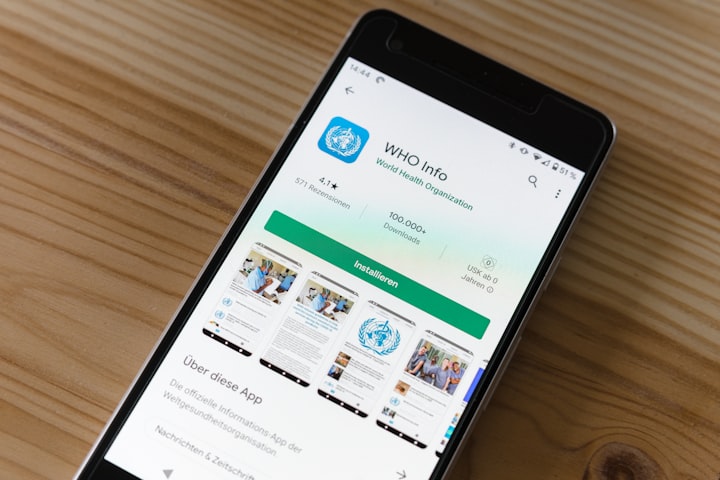From Ebola to Coronavirus: Can the WHO Prevent Deadly Epidemics?
A Research Paper Exploring the Topic

Note: Vocal does not let me do footnote citations, so I put the numbers in parentheses in the text and again with their source at the end.
For as long as disease outbreak has been a thing, humans have been trying to prevent it. From the term quarantine first coined and put into use in Italy during the Black Plague outbreak in the thirteen hundreds, to the World Health Organization (WHO) today, humans have tried and failed to contain deadly epidemics. Ever since its foundation in 1948, the WHO has worked tirelessly to fight deadly epidemics. However, from Ebola to Coronavirus- the World Health Organization cannot prevent deadly epidemics.
Most people today are very familiar with the seemingly strict Covid-19 prevention guidelines, yet still question how the virus is still spreading. For starters, the WHO cannot force the countries to do anything. A major issue that let the SARS-CoV-2 virus run unchecked across the world was the lack of countries willing to comply with the WHO’s guidelines. In an interview with Dr. Guénaël Rodier, the 2000-2005 director of WHO’s Communicable Disease and Response unit, comments on this. “There are no police or fines here. There are, however, strong incentives for countries to comply. In today’s information society, you cannot ignore or hide a problem for very long.” He also says, “The fear of being named and shamed by the media and other countries concerned by the situation is in itself an incentive.” (1)When it comes to the Coronavirus response, this incentive was not enough. A primary example of this is stated in the Nature Journal by Joanne Liu, a former president of Médecins Sans Frontières. “The biggest issue to me is that for six to eight weeks after the PHEIC [public health emergency of international concern] declaration, countries, except for in Asia, sat on their hands,”. (2)Not only did countries mostly ignore this alarm, there is also some controversy on whether or not this alarm was sounded too late. There have been multiple claims of incompetence by the WHO from various parties, as outlined in a 2020 article from The Guardian.
The W.H.O. really blew it. For some reason, funded largely by the United States, yet very China centric,” tweeted Donald Trump on 7 April, summing up just one of the many lines of criticism the WHO is currently facing. It is not just Trump – even some of the WHO’s supporters in government, academia and NGOs argue that since the start of the coronavirus crisis, it has caved in to nationalist bullies, praised draconian quarantine measures and failed to protect the liberal international order of which it is a linchpin. “You’ve got a situation where it looks like WHO doesn’t want to exercise its authority,” said David Fidler, a fellow in global health at the Council on Foreign Relations and a regular consultant to the WHO. (3)
Some experts, beyond just political figures, believe that this incompetence could have made a difference in the early stages of the pandemic. The article in Nature journal also discusses potential ways to improve the early warning system for disease outbreaks. There will be talks continued at the World Health Assembly in May 2021. They will discuss the possibility of a new treaty or a color-coded warning system. (4)
Another epidemic that the WHO failed to prevent was the Ebola outbreak of West Africa in 2014. This epidemic took the world by surprise, and spread by many means outside of the WHO’s realm of control. The first thing that set the WHO up for failure was the location of this epidemic: West Africa. All previous Ebola outbreaks have been concentrated in East and Central Africa, so the nations of the west were equipped to handle Ebola. Julia Belluz outlines a good example of what communication should look like by describing how Uganda has contained four Ebola outbreaks. As soon as a case is even suspected, it is reported to the proper officials. They then use all forms of media to blast all sorts of information on how to stay safe, even when the virus hit in densely populated urban areas. In West Africa, this communication was all but existent for various reasons. One key reason for poor communication is high illiteracy rates. “Health campaigning and raising health literacy is not easy in places where people can't read. As you can see in the map below, the countries that are now most affected by Ebola — Guinea, Liberia, and Sierra Leone, circled in green — are also the ones with the lowest literacy rates in the world.”(5) This serves as a problem because often the communities most affected by the virus are poor, rural communities. These communities also cannot afford a TV or radio to get this kind of information. Due to this lack of information, there was a large place for misinformation. The article by Vox News describes how rumors of cures spread fast. Some of these baseless and unfounded “cures” include a hot water with salt bath, hot chocolate, coffee, and even faith healing. The situation in Nigeria got so bad, that they even had to hire a rumor manager.
In the US, the FDA has warned consumers to watch out for Ebola quackery, while African public health officials are getting creative to debunk the lies. The electro-beat song 'Ebola in Town' was created to set the record straight about how to avoid the illness. "Ebola, Ebola in town. Don't touch your friend! No kissing, no eating something. It's dangerous!"In Lagos, Nigeria, the local government resorted to hiring a "rumor manager" to help wage a war on the misinformation that is swirling about. "The rumors themselves can actually cause a lot of damage," Lagos state Commissioner for Health Jide Idris told reporters. And he has reason to be worried. If this disease starts to take off in Lagos - Africa's largest city, population 22 million - some say this could "instantly transform this situation into a worldwide crisis.(6)
While this was not directly the WHO’s fault, the WHO did make some key mistakes. For example, at the start of the outbreak, the WHO relied on data provided by the governments of the outbreak. (Liberia, Sierra Leone, and Guinea) An article published by the National Institutes of Health and US National Library of Medicine explains the reporting situation. In May of 2014, data showed that the outbreak, which was believed to have been concentrated in Guinea, appeared to be nearing an end. In spite of this data, hopes were soon dashed. By June, flaws were revealed in data and the WHO’s management system.
That only one case had been officially reported was not especially surprising at the time, given the well-acknowledged paucity of the disease surveillance systems and the absence of robust laboratory verification capacity. Yet rather than challenge these official figures, the WHO secretariat took the government’s statistics at face value, seemingly accepting it was an accurate assessment. Later, when the Guinean health minister asserted at the WHA that his country’s epidemic was now under control, the IO again failed to contest this claim, accepting the health minister’s declaration. Between the end of the WHA [World Health Assembly] and two weeks later on 10 June 2014, however, Guinea and Sierra Leone recorded approximately 150 new infections, bringing the cumulative total to 440 suspected or confirmed EVD [Ebola Virus Disease] cases. (7)
The article also states, “In fact, the WHO is widely considered to have ‘failed’ the international community during the EVD outbreak.” (8)
While Ebola and the Coronavirus are the most well known epidemics today, there have been many other epidemics that were not properly prevented by the WHO. According to an article titled “WHO failures led to hundreds of thousands dying from Malaria, say medical experts.”(9) To summarize, the WHO sent the incorrect and outdated drugs to countries in Africa fighting Malaria. They were accused of committing malpractice, but they deny this, claiming switching their approach is a process. The WHO set a goal in 1998 to halve the number of deaths by 2010. However, the deaths continued to climb, with the majority being children under five.(10) The WHO also mishandled the 2009 H1N1 epidemic. This influenza strain started in a rural village in Mexico, and quickly spread. The first mistake made by the WHO was naming this variant “Swine Flu” instead of something regional or relating to Mexico. The goal was to prevent damage to the Mexican economy, but did more harm than good. Mass cullings of pigs took place, and many countries banned imports, harming many economies.(11) Another example of a disease WHO cannot prevent is Cholera. The only way to prevent this is to provide safe, clean drinking water for everyone, and the WHO is not able to do that. Countries in Africa where these epidemics have hit tend to have poor human waste disposal systems. Another thing that is also beyond the WHO’s control is food. “Ensuring the safety of food is yet another important control measure. During an epidemic of cholera, it is important that all food—including leftovers—be thoroughly cooked (to a core temperature of 70 °C [158 °F]) and that it be eaten before it cools.”(12) Many countries in Africa, especially in rural areas where Cholera is common do not have the resources to cook all food in this manner.
When it comes to the World Health Organization’s ability to prevent epidemics, some things they just simply cannot control. They can advise the world to the best of their ability, but in the end, they simply cannot force anybody to comply. They have no military or police force, or even a way to punish those who ignore their warnings. Stephen Burnanyi from the Guardian says it best, “For all the responsibility vested in the WHO, it has little power.”(13)
Bibliography
Works Cited:
Belluz, Julia. “Seven reasons why this Ebola epidemic spun out of control.” Vox. 4 September 2014. https://www.vox.com/2014/9/4/6103039/Seven-reasons-why-this-ebola-virus-outbreak-epidemic-out-of-control. Accessed 30 April 2021. (5, 6)
Buranyi, Stephen. “The WHO v coronavirus: why it can't handle the pandemic.” The Guardian. 10 April 2020. https://www.theguardian.com/news/2020/apr/10/world-health-organization-who-v-coronavirus-why-it-cant-handle-pandemic. Accessed 6 May 2021. (3,13)
Claeson, Mariam, and Waldman, Ronald. “Cholera.” Britannica Academic. https://academic-eb-com.proxy.kyvl.org/levels/collegiate/article/cholera/82306#article-contributors. Accessed 5 May 2021. (12)
Kruck, Andreas, et al. “What Went Wrong? The World Health Organization from Swine Flu to Ebola.” National Center for Biotechnology Information. 9 October 2017. https://www.ncbi.nlm.nih.gov/pmc/articles/PMC7122988/. Accessed 6 May 2021. (7, 8, 11)
Laurance, Jeremy. “WHO failures led to hundreds of thousands dying from malaria, say medical experts.” Independent. 16 September 2013. https://www.independent.co.uk/news/science/who-failures-led-to-hundreds-of-thousands-dying-from-malaria-say-medical-experts-55163.html. Accessed 6 May 2021. (9, 10)
Maxmen, Amy. “Why did the world’s pandemic warning system fail when COVID hit?.” Nature. 23 January 2020. https://www.nature.com/articles/d41586-021-00162-4. Accessed 27 April 2021. (2,4)
“New rules on international public health security.” World Health Organization, https://www.who.int/bulletin/volumes/85/6/07-100607/en/ Acessed 27 April 2021. (1)
Works Consulted:
McDowall, Angus, and Kelland, Kate. “Saudi MERS response hobbled by institutional failings.” Reuters. 12 June 2014. https://www.reuters.com/article/us-saudi-mers-failings-insight/saudi-mers-response-hobbled-by-institutional-failings-idUSKBN0EN1I520140612. Accessed 6 May 2021.
Qui, Jane. “Chasing Plagues.” Scientific American. June 2020. https://web-b-ebscohost-com.proxy.kyvl.org/ehost/detail/detail?vid=6&sid=3620acb7-65d2-4673-8a42-5b759c39ac9c%40sessionmgr103&bdata=JkF1dGhUeXBlPWlwLHVpZCxjcGlkLHVybCZjdXN0aWQ9czExNzYxOTI%3d#AN=143183009&db=hxh. Accessed 5 May 2021.
Smuskiewicz, A. J. "Epidemics and Pandemics: Overview." Issues: Understanding Controversy and Society, ABC-CLIO, 2021, issues.abc-clio.com/Topics/Display/913369?cid=41. Accessed 27 Apr. 2021.
About the Creator
Caroline Katko
My name is Caroline Katko and I live in Kentucky. When I'm not writing or doing school work, I enjoy riding and competing with my horses!






Comments
There are no comments for this story
Be the first to respond and start the conversation.